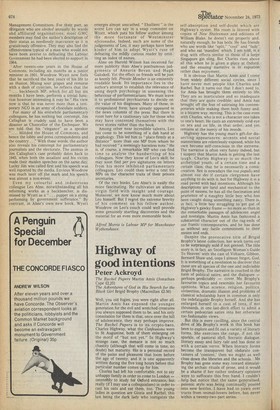Highway of
good intentions
Peter Ackroyd
The Rachel Papers Martin Amis (Jonathan Cape £2,25) The Adventures of God in His Search for the Black Girl Brigid Brophy (Macmillan £2.50) Well, you old fogies, you were right after all. Martin Amis has exposed the younger generation for the evil and wretched creatures you always supposed them to be, and his only consolation for them is that, once over the hill of adolescence, they may perhaps improve. The Rachel Papers is to its crypto-hero, Charles Highway, what the Confessions were to St Augustine, both of them enlarging on the motif of "but not yet." In Highway's strange case, the menace is not so much chastity (although that will come in time, no doubt) but maturity. His is a personal record of the pains and pleasures that loom before the age of twenty, and it is one apparently written during the five long hours before that particular number comes up for him.
Charles had left his comfortable, not to say unhappy family in order to come to London — ostensibly to study for Oxford entrance, but really (if I may use a colloquialism) in order to cast his oats and eat them, too. The young ladies in question are Gloria and Rachel, this last being the dark lady who instigates the
self-absorption and self-doubt which are Highway's oyster. His room is littered with copies of New Statesman and editions of William Blake, he doesn't eat properly and. naturally enough, he has boils. He has friends who use words like "split," "cool" and "fade" and who eat 'mandies' which, I am told, is a drug with effects similar to those of a large Singapore gin sling. But Charles rises above all this when he is given a place at Oxford. and the ensuing narrative is in expiation rather than enjoyment.
It is obvious that Martin Amis and I come from widely different social circles, since I have never met people like Charles and Rachel. But it turns out that I don't need to, for Amis has brought them entirely to life. They are so inarticulate and so inadequate that they are quite credible, and Amis has brought off the feat of satirising his contemporaries while making them both funny and, in a bizarre way, moving. This is the case even with Charles, who is not a character one takes to one's heart. He casts an extremely cold eye on sex and on life, in that order, and yet remains at the mercy of his moods.
Highway has the young man's gift.for dissecting appearances: accents and social mannerisms are relentlessly exposed, while his own become self-conscious in the extreme. The narrative is often very funny indeed, but I suspect that Martin Amis is getting the last laugh. Charles Highway is so much the archetypal youth, of a certain time and a certain class, that he is necessarily a comic creation. Sex is nowadays the vox populi, and almost vox dei if certain clergymen have anything to do with it, but for Highway it is a road paved with bad intentions. Although his descriptions are lurid and mechanical to the point of nausea, he has all the fascination and prurience of a naughty little boy who has been caught doing something nasty. There is, in fact, a little boy struggling to 'get put of Highway's gawky frame — no more so than in the remarkable passages of adolescent angst and nostalgia. Martin Amis has fashioned a substantial character out of the rag-ends of our frantic contemporaries, and he has done so without any facile commitment to their means and ends.
Despite the provocative title of Brigid Brophy's latest collection, her work turns out to be surprisingly mild if not genteel. The title story is, in fact, an 'Intelligent Woman's Guide To Heaven' with the cast of Voltaire, Gibbon, Bernard Shaw and, oops I almost forgot, God. It is something of a revelation to discover that these are all species of the one and indivisible Brigid Brophy. The narrative is couched in the form of political satire, and the dialogues — perhaps predictably — cover Ms Brophy's favourite topics and resemble her favourite opinions. What science, religion, politics. vivisection, dramatic illusion and problems of classical scholarship have in common is only the indefatigable Brophy herself. And she has enlarged herself to a cast of tens, if not thousands, in one last-ditch effort to admit a certain pedestrian satire into her otherwise too fashionable views.
But this is mere cavilling, since the central drive of Ms Brophy's work in this book has been to explore and fit out a variety of literary forms. She exercises the range, if not the sparkle, of pastoral idyll, Socratic dialogue, literary essay and fairy tale and has done so with a certain verve. When literary forms become the transparent but obdurate containers of 'content,' then we might as well close down the libraries and the schools.. Ms Brophy has gone some way toward stimulating the archaic rituals of prose, and it would be a shame if her rather ordinary opinions were to suffocate this free hand. I couldn't help but notice that the same generalised, polemic style was being continually poured into new bottles. I have had to yawn over tracts from animal-lovers before, but never within a twenty-two part series.


































 Previous page
Previous page